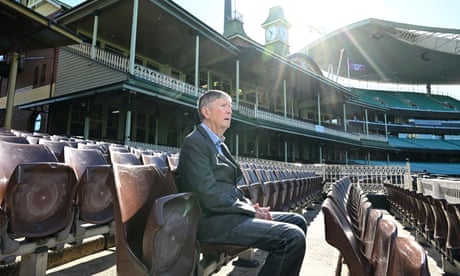
When it comes to those who have penned a word on rugby league, none stand taller than Ian Heads, who died on Monday at the age of 81 after a long illness.
One of just two writers inducted to the Rugby League Hall of Fame, Heads helped shape the way rugby league was viewed for nearly half of the code’s existence in this country. The wordsmith’s historical books gave weight to the game’s past and he was honoured with an Order of Australia Medal.
“Ian was one of rugby league’s great journalists and a true gentleman,” former Rugby League Week editor Mitch Dale said. “A rugby league journalist, author and historian without peer.”
There is not a rugby league library in the world that isn’t filled with books penned by Heads. They include True Blue, revered by many as the greatest book on the game ever written, The Night The Music Died, a celebration of Western Division’s famed 1974 Amco Cup win, and The Great Grand Final Heist, the definitive history of the controversial 1969 decider. He also wrote notable biographies from the likes of Brad Fittler, Wayne Pearce, Jack Gibson and Richie Benaud, a great friend of Heads.
Beginning his career in the early 1960s – the era of such greats as Tom Goodman, Bill Mordey and Ernie Christensen, when newsrooms were filled with cigarette smoke and the click-clacking of typewriters – Heads worked for both Sydney newspapers, the Daily Telegraph and the Sydney Morning Herald.
When Rugby League Week launched in 1970, Heads joined and by the early 1980s he had become editor. It was a time when circulation of the magazine reached 100,000 a week, forcing Sydney newspapers into greater coverage of the sport. The rise of the magazine left an “indelible mark” on the game, according to Dale.
Heads wrote not only under his own name but under numerous nom de plumes including “Sherlock”, Rugby League Week’s famed “super snoop” who had his own column from 1984 to 2000. Heads finally admitted to the ruse in the magazine’s 1,500th issue.
“It was a witty, irreverent and brilliantly-written weekly staple of Rugby League Week that found light in the game while also holding decision makers to account, written with Ian’s trademark flair,” Dale said.
Outside of mentoring generations of journalists and sportswriters, this one included, arguably his most critical contribution to the game was the formation of the Immortals concept in 1981. Humble to a fault, Heads credited what is now the Australian game’s greatest honour to a “brainstorm” of the three judges Tom Goodman, Frank Hyde and Harry Bath who were “holed up at the front bar of the Wentworth Hotel and with plenty to keep the trio hydrated”.
Heads failed to note that it was he who organised the meeting of the trio and he who paid the drinks bill.
“Ian was never comfortable taking credit for the concept but I have no doubt that the Immortals would not have become the icon that it was without his guidance,” Dale said.
Journalists are a cynical lot by nature, yet there was not a story about rugby league that did not pique his interest. He may have been central to some of the biggest stories in the history of the game but adored the yarns from every corner of the game just as much.
“Ian was always so enthusiastic about any idea you may have for a story or a book on rugby league,” author and former radio host Michael Croke said. “I told him about the small town of Manildra being in the Group 11 grand final and he rang me the next day and said he was on his way to write the story. He loved tales of country rugby league.”
Historian David Middleton told NRL.com in 2023 that the words he most associated with Ian were “integrity, decency and respect”. That integrity was required during the heat of the Super League War. Working for the Daily Telegraph in 1999, Heads was stunned when a story he wrote on the impending march to keep South Sydney in the competition did not run. He determined he could no longer write for a paper which had both missed a huge story and was willing to ignore a club of such standing and history. He had no problems leaving the dancefloor when he didn’t like the tune.
There is not a tribute to Heads that does not use the word gentleman. He truly was a beautiful, thoughtful and sweet man who had time for any aspiring writer, and never outwardly acted as if any question was foolish. He was trusted by the game’s most hard-nosed powerbrokers and admired by anyone foolish enough to walk in his shadow.
The word that most comes to mind when thinking of Heads, though, is humble. You could spend hours having a coffee with him and then leave cursing thatyou had allowed him to turn the conversation away from the myriad great stories in his memory to focus on you. The genteel Heads never once viewed himself as what he was: the greatest rugby league historian and journalist, the man who put together its highest honour, and a newsbreaker and story-teller without peer.